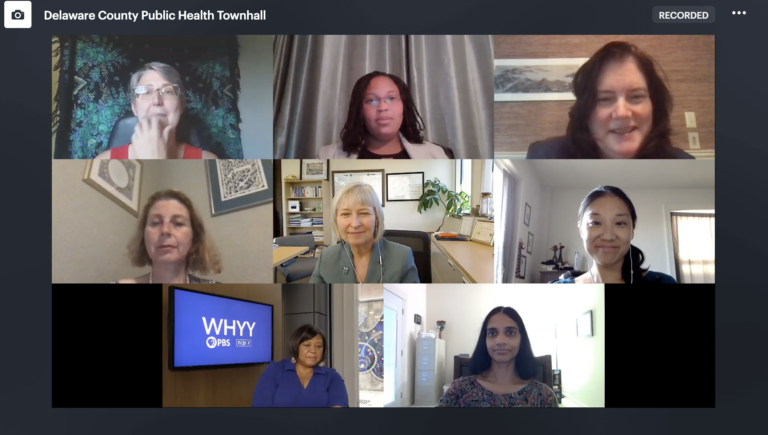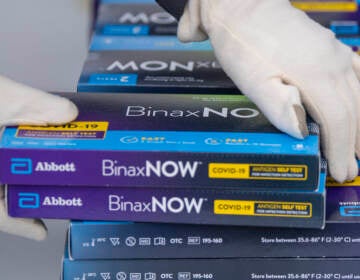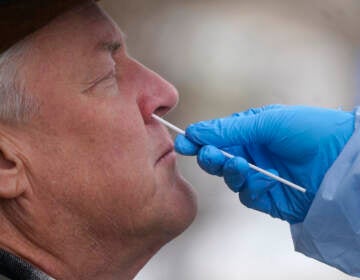A town hall update on Delco’s move toward a health department all its own
Highlighted at the virtual session, attended by 200-plus, was a Johns Hopkins report assessing the public health profile and availability of resources.

A virtual town hall about a prospective public health department in Delaware County drew 200 people. (Screenshot)
Delaware County has never had a health department.
Early in the coronavirus pandemic especially, that severely limited how outbreaks could be tracked within the county’s borders, exacerbating public health shortcomings, as well as health disparities that elected officials say have existed for decades.
Now, county leaders and a major philanthropic organization are laying out a blueprint for creating a health department to serve the densely populated county’s 560,000 residents.
“By the end of 2021, we hope, and our goal, is to have a Delaware County health department that is operational,” said Dr. Monica Taylor, vice chair of the Delaware County Council.
The council, the Foundation for Delaware County, and WHYY co-hosted a virtual town hall Thursday afternoon on the topic of public health. The Foundation for Delaware County, a community foundation that promotes the health and well-being of the county’s residents, is among WHYY’s grant funders. The 90-minute event included a panel discussion moderated by Sandra Clark, WHYY’s vice president for news and civic dialogue.
Highlighted at the town hall, attended by more than 200 people, was a recently released report assessing the public health profile and availability of resources in Delaware County. Conducted by the Johns Hopkins Bloomberg School of Public Health, the 158-page report drew on nearly 1,800 surveys, extended interviews, and focus groups to identify the needs a successful health department could meet.
“Basically, the point was to find out what was going on in Delaware County,” said Beth Resnik, one of the report’s authors.
Investigators found residents voicing concern about access to health care, the availability of mental health services, and environmental health, among other issues. Though the county has improved in some measures since a similar analysis was done in 2010, it’s seeing worsening reports of depression, suicide, sexually transmitted diseases, asthma, cardiovascular disease, and deaths from drugs and guns, the research found.
There are also wide disparities in health outcomes by race and class. For example, while infant mortality rates for the county as a whole have gone down over the last decade, Black infants are still three times as likely to die as white infants.
All the data was collected before the coronavirus hit the region. COVID-19 has amplified many of those same negative outcomes, Resnik said.
Early on in the pandemic, the lack of a local health department created significant problems for Delaware County. In the absence of a local entity to track cases, officials initially turned to Pennsylvania’s overburdened Department of Health. But the state, under its privacy rules, could not provide specific information to local officials about where within the county residents were testing positive for COVID-19. That left Delco without vital information to use in isolating positive cases, identifying outbreaks, or assisting with contact tracing.
A bit of relief came in late March, when neighboring Chester County made arrangements to use its own health department to assist Delco. That aid has included coordinating communications, contact tracing, getting data online, and locating testing kits.
“This was a large lift for them to do, and we are grateful they took this on,” said Rosemarie Halt, a health policy consultant for Delaware County.
Prior to the pandemic, without any central agency to consolidate epidemiological resources, residents had trouble connecting with available health services, according to the report. Officials struggled to gather consistent data about health trends at the county or neighborhood levels. There were few ways to identify duplicative services or best practices.
The main recommendations of the Johns Hopkins report focus on setting up a department that is better able to consolidate resources and enable collaboration, gather more and better data, and establish greater accountability in health care services available to residents.
The issue of establishing a health department for the county is hardly new. In July 2019, as the Delco Times reported, the County Council voted to spend $91,877 commissioning the Johns Hopkins study. It was a prominent campaign issue in last year’s elections, which ultimately swept Democrats into power for the first time in the county’s history since the Civil War.
Although the vast majority of Pennsylvania counties do not have health departments of their own, Delco is by far the most populous in that group, and an anomaly among its peers in the southeastern part of the state.
Community groups and advocates in the county had spent years laying the groundwork for establishing such a department. But it had become an increasingly partisan issue over the years, Halt said, with Republicans generally opposed and Democrats generally supportive.
“It just took, I think, all the stars aligning,” Halt said of the County Council’s urgent push for the department after it flipped Democratic.
In many ways, the pandemic has helped the cause, with residents giving more attention than ever to epidemiology and public health resources. Taylor said the current circumstances have lessened the volume of critical feedback about the endeavor.
The council is soliciting proposals to conduct an economic impact study on how much it will cost to set up the department.
“We’re hoping it’ll be done by mid-fall,” Taylor said.
Such a study will look at the availability of state and federal funds that might help offset some of the costs for Delco taxpayers.
That may be difficult, though, cautioned Frances Sheehan, president of the Foundation for Delaware County, given that the state legislature has flat-funded county health departments.
Her advice was for county residents to lobby lawmakers directly on the issue and stress the need to make it a funding priority.
“Without that advocacy, there will be pushback,” Sheehan said.

Get daily updates from WHYY News!
WHYY is your source for fact-based, in-depth journalism and information. As a nonprofit organization, we rely on financial support from readers like you. Please give today.






